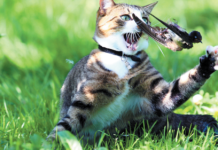[From Tufts August 2011 Issue]
I have a cat who is a purebred Pixie-bob that has a propensity to lick portions of his body until they are devoid of hair. He has no weight loss, a good appetite, no hairballs and no cutaneous infections. He has been neutered and is 8years old.
I do not want to give him medications if possible. Is there something else, like a diet change or an environmental alteration that I could make that would improve his condition? If he went untreated, could he cause significant damage with his incessant licking behavior?
Rose Alfred
Dear Rose: Thanks so much for your question. You certainly have an interesting breed of cat. A Pixie-Bob has an intriguing track history going back to the breed founder, named Pixie.
Anyway, the licking problem sounds a lot like psychogenic alopecia. Of course, it is important to rule out all medical causes of over-grooming first, in particular, allergy. If you draw a blank there and, in particular, if your pet does not respond to steroids, then a diagnosis of psychogenic alopecia is pretty much confirmed.
Treatments we would employ for such a cat include major league environmental enrichment, such as perhaps getting a compatible buddy for your cat. In most cases, some kind of medical treatment is needed in addition to that in order to resolve the problem. Typically, medications, like Prozac™ (veterinary trade name Reconcile), are employed and, in most cases, meet with a good deal of success. The only other method would be to employ some non-drug, neurophysical approach in hopes of resolving the problem. It has been shown that the amino acid N-acetylcysteine works in the human condition of trichotillomania. Alternatively, the B-vitamin-like compound inositol has been shown to help in compulsive disorder in people, but the dose for this has yet to be established for cats.
Hope this information is of some use to you going forward. If you would like us to help, we do have a VETFAX service by which we can communicate with your veterinarian to help resolve the problem.
Nicholas Dodman, BVMS
Animal Behavior Clinic Director
Cummings School of Veterinary Medicine
at Tufts University



